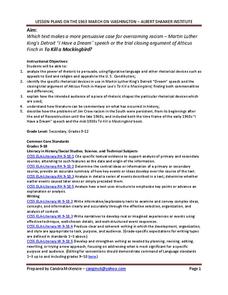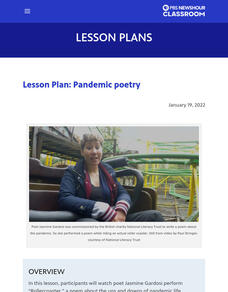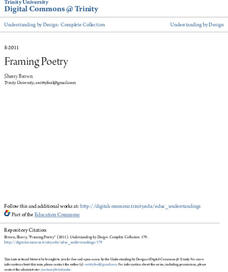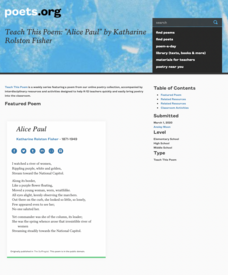Albert Shanker Institute
Making the Case for Equality: A Comparison
Martin Luther King Jr's " I Have a Dream" speech and Atticus Finch's closing argument during the trial of Tom Robinson both address the societal need to overcome racism. After examining the rhetorical devices and figurative language used...
Trinity University
Framing Poetry
The big idea in this poetry unit plan is that structure and content work together to create meaning. Class members learn how to identify and mark the metrical patterns and line lengths used in poems. They study the structure of various...
Wadsworth Atheneum Museum of Art
Where I'm From: Symbolism in Paint and Poetry
After a review of symbolism, class members use the provided worksheet to first list the objects they observe in Arnold Mesches' painting "Coney Island" and then suggest possible symbolic meanings for each of the objects. A second...
National Endowment for the Humanities
García Márquez’s Nobel Prize Speech: “The Solitude of Latin America”
To conclude a study of One Hundred Years of Solitude, class members analyze Gabriel Garcia Marquez's Nobel Prize in Literature acceptance speech. After a whole-class discussion of the main ideas in the speech, individuals draft a...
National Endowment for the Humanities
The Realism in Magical Realism
A lesson on magical realism has young historians research how Garcia Marquez weaves historical events and his own experiences into One Hundred Years of Solitude. Using historical records and information found in a biography of Garcia...
National Endowment for the Humanities
Magical Elements in Magical Realism
How does Gabriel Garcia Marquez make the magical elements of his novel appear so real? That's the challenge facing readers of One Hundred Years of Solitude. Scholars examine the tone and descriptive details Garcia Marquez uses to make...
National Endowment for the Humanities
The Metamorphoses and Later Works of Art: A Comparison of Mythic Imagery
In a lesson on The Metamorphoses, scholars compare how graphic artists use mythic imagery to represent Ovid's tales. Each group selects a work of art paired with Ovid's version of a myth and compares how both present the story.
National Endowment for the Humanities
The Metamorphoses and Modern Poetry: A Comparison of Mythic Characters
To gain an appreciation of the power of point of view, class members compare Ovid's version of the myth of "Orpheus and Eurydice" with that used by H.D. in her poem, "Eurydice." Individuals then craft a reflection in which they use...
National Endowment for the Humanities
The Metamorphoses and Genesis: A Comparison of Creation-Flood Stories
Creation and destruction. Scholars use a Venn diagram to compare the creation story in Ovid's The Metamorphoses with that in the book of Genesis. Pupils then note differences between the two texts and offer suggestions for why the texts...
Academy of American Poets
Teach This Poem: "When Fannie Lou Hamer Said" by Mahogany L. Browne
After watching an excerpt from a video of Fannie Lou Hamer's testimony before Congress, pupils do a close reading of Mahogany L. Browne's poem "When Fannie Lou Hamer Said," annotate words and phrases that draw their attention and list...
Academy of American Poets
Teach This Poem: "Alice Paul" by Katharine Rolston Fisher
Powerful women need not look like Wonder Woman. After writing a paragraph about a strong woman they know, young scholars examine images of Alice Paul and then do a close reading of Katharine Rolston Fisher's poem "Alice Paul." Finally,...
National Endowment for the Humanities
“The Great Migration” by Minnie Bruce Pratt
Minnie Bruce Pratt's poem, "The Great Migration," offers young scholars an opportunity to reflect on how where we come from influences who we are. Groups conduct a close reading of the poem, recording observations about the poem's...
National Endowment for the Humanities
“Every Day We Get More Illegal” by Juan Felipe Herrera
A study of Jan Felipe Herrera's poem "Every Day We Get More Illegal" opens the door for a discussion on immigration. To begin, class members examine the photograph "Desert Survival," record their observations of the image, and then...
California Department of Education
Hitting the Write Note: Writing a Proposal
To whom it may concern ... Scholars undergo the process of writing a letter to an authority figure. The instructional activity asks writers to compose a formal letter requesting a music therapy space. Pupils learn how to submit a project...
California Department of Education
Call the Tune: Music in Literature
I am dancing to the music in my head. Scholars learn to listen for music in their heads as they read literature and poems. After they identify and analyze poetic devices that relate to music, they create their own musical poems.
National Endowment for the Humanities
The Glass Menagerie: Impact of Expressionism
Young scholars are challenged to write a realistic analysis of Tennessee Williams' nonrealistic memory play, The Glass Menagerie. Writers use the evidence gathered on their worksheets to craft an effective thesis and concluding statement...
National Endowment for the Humanities
The Glass Menagerie: Key Themes
Using the list of expressionist techniques generated in the first lesson, groups analyze how Williams uses these techniques to develop one of the play's themes. The whole class then shares and discusses the examples they found where...
National Endowment for the Humanities
The Glass Menagerie as Expressionist Theatre
The first lesson in a three-part unit has high schoolers examine The Glass Menagerie as an example of expressionist theatre. After reading a short article about expressionism, scholars list expressionist techniques in Tennessee Williams'...
National Endowment for the Humanities
Societal Schisms and Divisions
The final lesson in the Crime and Punishment unit looks at the societal injustices depicted in Dostoyevsky's novel. Scholars examine the schisms between men and women, between wealth and poverty, between religion and skepticism, and...
Newseum
Quick Skim or Deep Dive? Picking the Right Search Strategy
To search online to find answers to some questions requires only a quick skim, while others demand deep research. Scholars engage in a lesson that teaches them the difference and how to craft questions that produce the best online search...
National Endowment for the Humanities
Man and Superman
Ordinary and extraordinary readers will find much to contemplate in a lesson on Crime and Punishment as they examine the dichotomies in Dostoevsky's novel. Scholars reflect on Raskolnikov's theory that extraordinary individuals are not...
National Endowment for the Humanities
Dostoevsky's Crime and Punishment
Pain and suffering do not have to be inevitable in a study of Crime and Punishment. A carefully scaffolded lesson plan introduces readers to the divided natures of the characters in Fyodor Dostoevsky's complex novel. Groups use the...
National Endowment for the Humanities
Literary Genres in “Moby-Dick”
Moby Dick is more than a whale of a tale narrated by Ishmael. A activity studying Herman Melville's classic novel asks readers to examine the different genres the author weaves into his story. Instructors model how to conduct a stylistic...

























